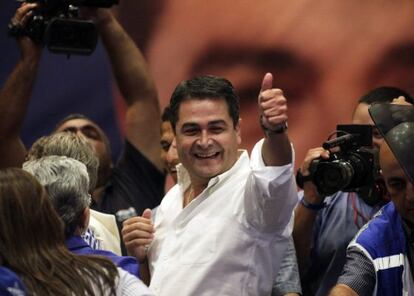Two frontrunners claim victory in Honduran presidential race
Ousted leftist leader Zelaya contends that government wants to rob his wife of victory

A former speaker of Congress took the lead on Monday in the Honduran presidential elections as the vote count continued after Sunday’s ballot. The leftist opposition immediately denounced that the conservative government and its ruling party contender were “stealing” the race.
With more than 54 percent of the votes counted, National Party candidate Juan Orlando Hernández was in the lead by just over five percentage points ahead of former first lady Xiomara Castro, who represents the Freedom and Refounding (Libre) party.
On Monday, former President Manuel Zelaya, who was ousted in a 2009 coup, claimed that the National Party was robbing his wife of the elections.
“Xiomara is winning the presidency. They can’t do this to us. They are stealing the elections,” Zelaya said during a news conference at the Supreme Electoral Tribunal (TSE).
As of Monday, TSE officials reported that Hernández was in the lead with 34.27 percent of the vote over Castro’s 28.67 percent. Hernández, a former speaker of Congress, proclaimed himself as the winner on Sunday night before his supporters, as did Castro in her Twitter account.
Mauricio Villeda of the Liberal Party (PL) and Salvador Nasralla of the Anti-Corruption Party (PAC) had 20.94 and 15.45 percent, respectively. Four other contenders drew less than one percent of the vote each.
It is expected that the Libre leftists will have a sizeable representation
“We are the new generation inside the party. We are entering another era,” said the 45-year-old Hernández, who afterwards prayed with his family and supporters in front of television cameras.
Hernández served as congressional speaker under President Porfirio Lobo, who came to office following a seven-month crisis stemming from Zelaya’s June 2009 ouster. During that period, then Congress speaker Roberto Micheletti served as de facto president.
Even though he has been a close aide to Lobo, Hernández had tried to distance himself from the president, whose administration has come under fire over a surge in violence and rampant poverty. As part of his economic platform, Hernández has proposed to privatize some state-owned companies, lift strict rules governing employment in an effort to attract foreign investment, and introduce a public assistance program.
“Hernández will continue to widen the neoliberal model that has ignited many protests against this government, and adding to more social conflicts will be the large representation of Libre in Congress and in many local governments,” said Gustavo Irías, director of the Center for Democracy Studies in Tegucigalpa.
Although results have not yet been announced regarding the composition of the 128-member Congress, it is expected that the Libre leftists will have a sizeable contingent through which to wield their influence for the next four years. Hernández’s National Party will have to seek alliances among other parties who are expected to also win seats.
Zelaya, Castro and their supporters have set up Libre and made it into the second-largest political force in Honduras in just 18 months. In her Twitter feed early Monday, Castro told her supporters that she had won the presidency.
Libre officials claim fraud took place in 20 percent of the voting tables across Honduras. As the first results trickled in on Sunday, Hernández was 10 points behind Castro.
If he is declared the eventual winner, it will be the first time since democracy was restored in 1981 that the same party has been in power for two consecutive terms.
Tu suscripción se está usando en otro dispositivo
¿Quieres añadir otro usuario a tu suscripción?
Si continúas leyendo en este dispositivo, no se podrá leer en el otro.
FlechaTu suscripción se está usando en otro dispositivo y solo puedes acceder a EL PAÍS desde un dispositivo a la vez.
Si quieres compartir tu cuenta, cambia tu suscripción a la modalidad Premium, así podrás añadir otro usuario. Cada uno accederá con su propia cuenta de email, lo que os permitirá personalizar vuestra experiencia en EL PAÍS.
¿Tienes una suscripción de empresa? Accede aquí para contratar más cuentas.
En el caso de no saber quién está usando tu cuenta, te recomendamos cambiar tu contraseña aquí.
Si decides continuar compartiendo tu cuenta, este mensaje se mostrará en tu dispositivo y en el de la otra persona que está usando tu cuenta de forma indefinida, afectando a tu experiencia de lectura. Puedes consultar aquí los términos y condiciones de la suscripción digital.








































